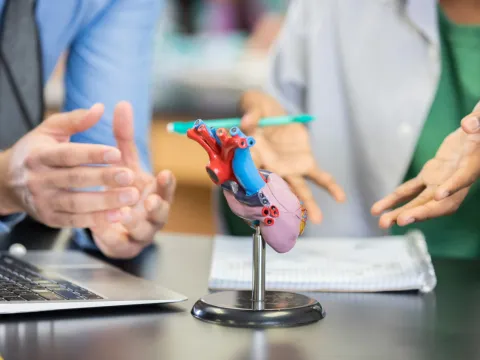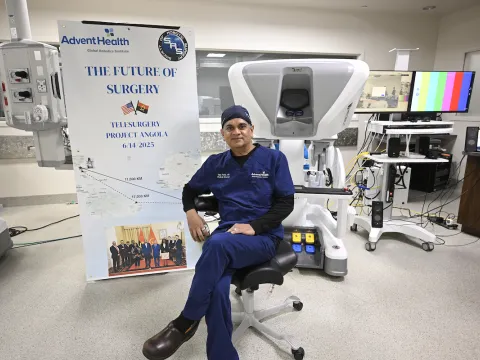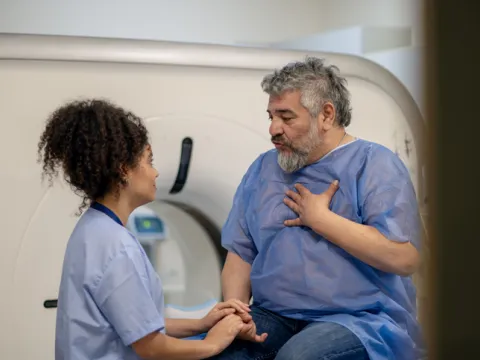- AdventHealth

Medical Director, IBD Clinic
AdventHealth
This Clinician’s View is written by Jennifer Seminerio, MD, Medical Director, AdventHealth IBD Clinic.
Nearly 1 in 100 Americans (approximately 3 million) currently suffer from inflammatory bowel disease (IBD), a group of disorders that cause chronic inflammation of the gastrointestinal (GI) tract, with Crohn’s disease and ulcerative colitis the two most common forms. Characterized by flares of inflammation that can cause diarrhea, weight loss, abdominal pain, fatigue and intestinal blood loss, these complex, chronic conditions not only negatively impact a person’s health and quality of life, but also lead to psychological distress, social isolation and economic hardship. As if those impacts weren’t significant enough, many IBD patients also face delays in diagnosis and treatment, along with limited access to specialized care.
These patients deserve better. While there is currently no cure for IBD, early, effective treatment can prevent complications and allow patients to lead full, active lives. However, the care required is resource-intensive, involving lifelong treatment, regular imaging, periodic endoscopies and costly medications. A new approach -- dedicated, multidisciplinary IBD specialty clinics – can bridge the current care gaps and improve patient outcomes. In September 2024, AdventHealth opened our Orlando IBD Clinic to provide IBD patients with a more comprehensive, coordinated, patient-centered approach to diagnosis, treatment and long-term disease management. We’re also advancing research, advocacy and patient education initiatives.
The Need to Transform IBD Care – A Personal Calling
While the numbers of people suffering from IBD are already staggering, the prevalence is rising, with an estimated 70,000 new diagnoses each year. For me, the call to improve care for IBD patients goes beyond the sheer numbers – it is a personal passion. I have never had IBD but during medical school, someone close to me suffered from severe Crohn’s, and I soon found myself in the role of primary caregiver. By their side through multiple setbacks, including an ostomy bag and several surgeries, I witnessed the physical, mental and social agony they endured. Each day was a new battle, and I grew to hate the disease. This fueled my decision to dedicate my career to improving care for patients with IBD.
AdventHealth’s Orlando IBD Clinic Takes an Interdisciplinary Approach
Since IBD impacts overall physical and mental health, we offer a comprehensive program with a multidisciplinary team to customize care for each patient, taking into consideration their needs and goals. This team includes:
- Gastroenterologists specialized in IBD
- Colorectal surgeons specialized in complex IBD surgery
- GI pathologists
- GI radiologists
- Interventional radiologists
- Dieticians
- Licensed mental health counselors
- Social workers
- Ostomy RNs
- IBD pain specialists
- IBD care navigators
- Infusion therapy and pharmacy specialists
Our goal is to ensure patients receive everything they need in one place, when they need it, with seamless communication among all their providers.
Improving Care Access and Treatment Monitoring
When an IBD patient experiences a flare, they need rapid access to a gastroenterologist. However, we know that for far too long, many of these patients have struggled to obtain that care, leading to preventable disease complications, including bowel obstructions, fistulas and even cancer. This can result in expensive and burdensome ER visits and hospitalizations. Our dedicated IBD clinic can provide that quick access.
We are also turning to new technologies that enhance IBD monitoring. In fact, earlier this year, our clinic became one of the first in Florida to use intestinal ultrasound (IUS) to help assess and manage treatment. A non-invasive, radiation-free imaging technique, IUS provides high-resolution transabdominal examination of the colon and small intestine without bowel preparation, fasting or contrast. It has emerged as a new tool for objectively assessing and monitoring IBD activity. IUS allows us to not only evaluate the thickness and inflammation of the colon and small bowel but also look at movement within them. It won’t replace our other diagnostic modalities, but it provides us real-time, in-office imaging to see if the disease we’re treating is active and if the current treatment is effective. This allows us to make timely point-of-care adjustments in partnership with our patients to help prevent disease progression.
Advancing IBD Care Through Quality Improvement and Research
We know quality of care directly impacts health and treatment outcomes for patients with IBD. In our efforts to continually improve health care quality, AdventHealth’s Orlando IBD Clinic has teamed up with IBD Qorus®, a groundbreaking national collaboration between patients and healthcare providers to streamline and improve the quality of IBD care across the country. Shared learnings and data have already led to improvements in key outcome measures such as reductions in corticosteroid and opioid use, emergency room visits and hospitalizations.
Having come from the University of South Florida (USF) Health Inflammatory Bowel Disease Center before joining AdventHealth, I’m passionate about advancing IBD research in Central Florida. At AdventHealth, we are rapidly building a robust research program to bring cutting-edge studies and innovations to our patients – emphasizing our commitment to academic excellence and evidence-based care.
Our Orlando IBD Clinic is currently participating in a pregnancy study called Women with Inflammatory Bowel Disease and Motherhood (WIsDoM). The WIsDoM registry is an international study exploring the effect of IBD and IBD-related surgery on fertility in women ages 18-45 with Crohn’s disease or ulcerative colitis. Approximately 50% of patients with Crohn's disease or ulcerative colitis are women, and many are diagnosed during their peak childbearing years. As providers, we’re often asked whether IBD, IBD surgery or IBD medications will affect their ability to become pregnant. Despite all the advances in our field, there are still several important questions about female fertility and IBD that remain unanswered and need further investigation. The results of the WIsDoM study will help to answer these questions so we can better inform and support our IBD patients when they try to become pregnant or during their pregnancy.
Additionally, we are currently participating in several industry studies with more on the horizon:
- A Study to Assess Adverse Events and Change in Disease Activity of Risankizumab Subcutaneous Induction Treatment for Moderately to Severely Active Crohn's Disease (AFFIRM)
- A Study of Guselkumab in Participants with Fistulizing, Perianal Crohn’s Disease (FUZION CD)
- ABTECT-2 – ABX464 Treatment Evaluation for Ulcerative Colitis Therapy-2
Accelerating IBD Patient Advocacy and Education
In addition to leading IBD research efforts, I also believe it is our responsibility to engage in patient advocacy and education. That is why I serve on the National Scientific Advisory Committee for the Crohn’s and Colitis Foundation and chair their Government and Industry Affairs Committee. I’m also involved in the Legislative & Public Policy Council for the American College of Gastroenterology.
While those are all important national efforts, I am especially excited about our work to develop and host the first-ever AdventHealth Crohn’s and Colitis Patient Education Conference on October 11, 2025. This event will bring together leading experts, patients and caregivers to discuss the latest advancements in IBD treatment, provide resources for disease management and foster a supportive community. In addition to our AdventHealth IBD team, this event will feature invited faculty from around the country, including Ohio State University Wexner Medical Center, Brigham and Women’s Hospital, Johns Hopkins - Sibley Memorial Hospital, Vanderbilt University Medical Center, University of Miami Health System, Mayo Clinic Jacksonville, USF Morsani College of Medicine, and University of Pittsburgh Medical Center (UPMC).
Paving a New Path Forward for Patients with IBD
I’m excited about the progress we’ve already made toward improving IBD care, but know it is only the beginning of a long journey. Moving forward, we are committed to continuing to listen, innovate and explore new ideas that will help our current IBD patients feel better -- mind, body and spirit -- while also improving care for the next generation.
Learn more about the IBD Clinic on the AdventHealth Digestive Health Institute website.





